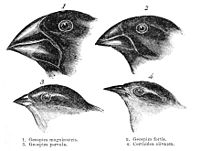
Photo from wikipedia
Theoretical treatments of the evolution of learning have a long and rich history, and although many aspects remain unresolved, the consensus is that the predictability and timescale of environmental change… Click to show full abstract
Theoretical treatments of the evolution of learning have a long and rich history, and although many aspects remain unresolved, the consensus is that the predictability and timescale of environmental change play a crucial role in when learning evolves. Directly testing these ideas has proven difficult because comparative experiments must assume many often unknowable aspects of an evolutionary past. Even within the present, identifying and accurately quantifying the relevant types of change can be problematic. Controlling or manipulating change can be difficult in many taxa. Within the theory, what is meant by change can markedly vary between models. Here, we present a targeted comparison of models to show this variation, and argue that standardizing measures of change can add tractability to models. We first review how change is emphasized in models of learning evolution and then describe the still small literature that directly tests the evolution of learning via digital evolution and experimental evolution. We then give an example of how to tie specific natural history to larger theory on learning evolution using the flag model of reliability and certainty and foraging in bumblebees. Learning, by its nature, is of fundamental importance to many fields. Theoretical treatments of learning evolution have been growing at a rapid pace, often with limited empirical applicability to natural systems and little congruence on what is meant by change across models. By explicitly defining change and tying models to natural systems, we can greatly increase our ability to not only understand when learning should evolve, but also when learning does evolve.
Journal Title: Animal Behaviour
Year Published: 2019
Link to full text (if available)
Share on Social Media: Sign Up to like & get
recommendations!